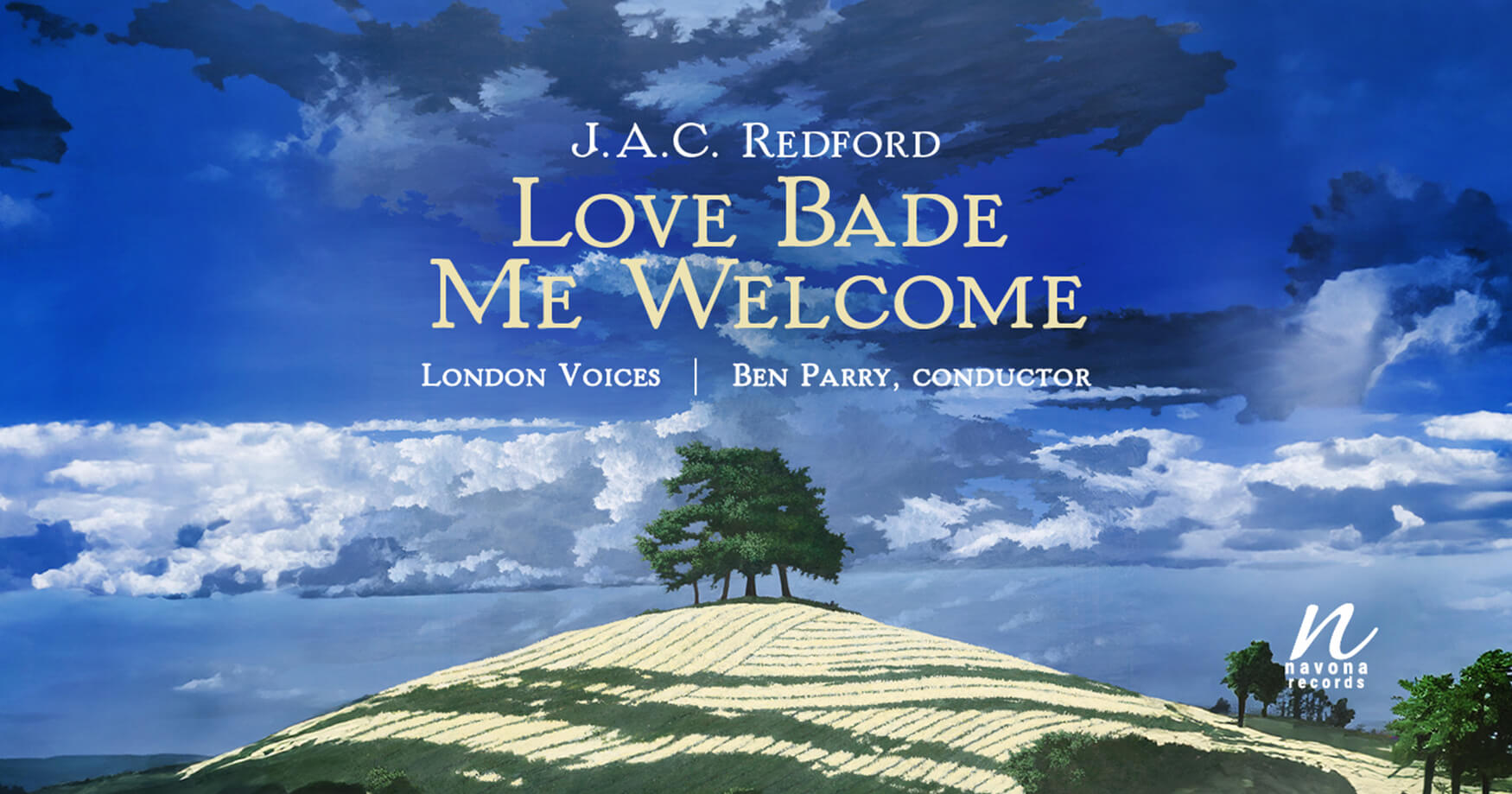
LOVE BADE ME WELCOME is a collection of choral music from composer J.A.C. Redford that explores spirituality, love, and the human experience. Blending traditional forms with contemporary harmonies with time-honored texts, Redford sets the poetry of Shakespeare, Gerard Manley Hopkins, George Herbert, and more.
Today, Redford is our featured artist in the “Inside Story,” a blog series exploring the inner workings and personalities of our composers and performers. Read on to learn about his early days as a rock keyboardist and singer, and his love for poetry, reading, and more…
What have been your biggest inspirations on your musical journey?
First of all, family. My mother was a singer and we always had music playing in our home. One of my earliest musical memories is that of listening to a recording of Stravinsky’s Firebird Suite on an old set of 78s which included one side of Deems Taylor commentary. We also had the Original Cast Recording of Bernstein’s West Side Story. I nearly wore out these recordings! The jazz and rock music of the 1960s had a huge impact on my imagination. The music of J.S. Bach has been another consistent inspiration, particularly as mediated through my studies in counterpoint. I can’t omit the influence of Tallis and Byrd, whose music I experienced from the inside while singing with a chamber choir. The music of 20th Century English and American composers, such as Benjamin Britten, Ralph Vaughan-Williams, Samuel Barber, and Aaron Copland have been significant inspirational voices for me. Also film composers Bernard Herrmann and John Williams. Shostakovich modeled for me what it means to thrive and inspire as an artist under very dark, dystopian circumstances. M. T. Anderson’s biography Symphony for the City of the Dead is an amazing record of this composer’s journey.
Take us on a walk through your musical library. What record gets the most plays? Are there any “deep cuts” that you particularly enjoy?
One recording that I can’t live without is Eleanor Steber’s glorious performance of Samuel Barber’s Knoxville: Summer of 1915. Another is John Shirley-Quirk’s recording of Ralph Vaughan-Williams’s Five Mystical Songs. I also love the King’s College recording of that composer’s Mass, and the John Barbirolli recording of his Symphony No. 5. Benjamin Britten’s Serenade for Tenor Horn and Strings is another favorite. I listen most often to the recording by Neville Mariner with tenor Robert Tear and Alan Civil playing horn. My listening habits are not solely classical, however. I love the discography of the Beatles, Joni Mitchell, Paul Simon, James Taylor, Jackson Browne, Bruce Cockburn, Stephen Stills, and Sarah Jarosz. I listen often to Stephen Sondheim’s musicals, especially Pacific Overtures and Sweeney Todd. The traditional music of England, Ireland, and Scotland has carved a furrow in my heart, especially through the recordings of Altan, the Chieftains and the trad revival bands Steeleye Span and Fairport Convention.
What were your first musical experiences?
As a child, my family took me to performances of Tchaikovsky’s Nutcracker and Gian Carlo Menotti’s Amahl and the Night Visitors, both of which enchanted my imagination and moved me deeply. In those days, the University of Utah sponsored an annual Summer Festival featuring an opera and a musical, which my family attended for several years running. I loved it! By the time I was 12, I was playing keyboard and singing in a rock band. I began playing the trombone in elementary school and took private lessons for several years, playing in a number of youth orchestras along the way, and finally as an improvising soloist in my high school stage band.
What are your passions beyond music?
I love poetry, reading (especially fiction, philosophy and theology), dinner conversations with friends, single malt whiskies, and watching televised international mysteries with my wife.
What’s the greatest performance you’ve ever seen, and what made it special?
There are too many of these to recount here, but two that come to mind immediately are Yo Yo Ma’s performance of the Bach Cello Suites at the Royal Albert Hall in 2015 and performances of the Vaughan-Williams fourth, fifth and sixth symphonies, in one 2012 Royal Albert Hall concert by the BBC Scottish Symphony Orchestra under Andrew Manze.
What musical mentor had the greatest impact on your artistic journey? Is there any wisdom they’ve imparted that still resonates today?
Robert Lentz, conductor of the Utah Youth Symphony, for his passion. Newell Dayley, for believing in my music and programming it while I was still an adolescent. Bruce Broughton, for collegial support at the start of my career in film music. Hal Johnson, my instructor in counterpoint, for his practical approach to compositional technique. Frederik Zweig, for connecting me with the Old World conducting musical skills and values. Albert Harris, for teaching me about orchestral color. Walter Scharf, for pushing me to take risks with my musical ideas. Thomas Pasatieri, for cultivating my own compositional voice. And my friends and colleagues Thomas Newman and James Horner, for trusting me with the orchestration of their music.

J.A.C. Redford is a composer, arranger, orchestrator and conductor of concert, chamber and choral music, film, television and theater scores, and music for recordings. Artists and ensembles that have performed his work include: Academy of St. Martin in the Fields, Paul Barnes, Joshua Bell, Liona Boyd, Cantus, Chicago Symphony, De Angelis Vocal Ensemble, Debussy Trio, Israel Philharmonic, Kansas City Chorale, Los Angeles Chamber Singers, Los Angeles Master Chorale, Anne Akiko Meyers, Millennium Consort Singers, New York Philharmonic, Phoenix Chorale, Staatskapelle Dresden, St. Martin’s Chamber Choir, St. Paul Chamber Orchestra, Utah Chamber Artists and Utah Symphony.

